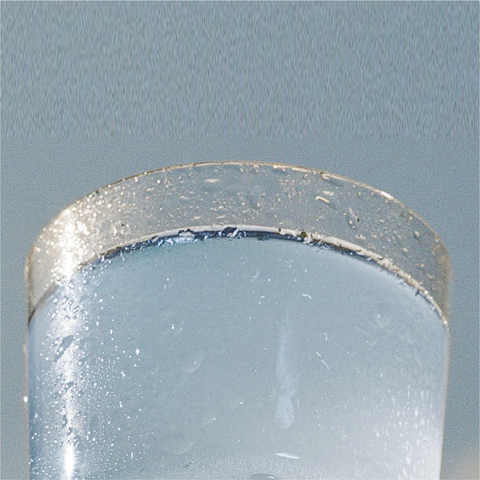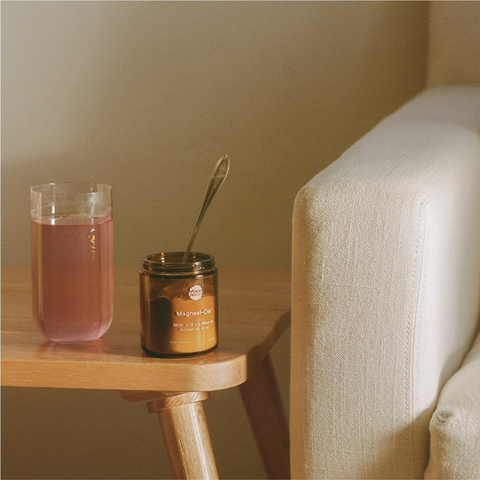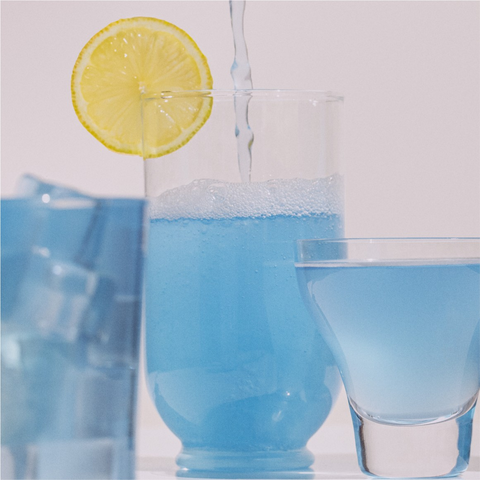With so many collagen supplements on the market made from animal byproducts, you might be wondering, what about vegan collagen? Does a viable alternative exist, and just as importantly, does vegan collagen work well?
Collagen tends to come from cowhides, bones, or tendons (bovine collagen), fish scales (marine collagen), or other animal parts. But if you don’t love the idea of animal collagen, and you want to take a collagen supplement to improve your skin elasticity, softness, and texture, here’s what you need to know about vegan collagen and how it works in your system.
What is Vegan Collagen?
Collagen gives our skin elasticity and structure to keep it from sagging. It’s a protein that already exists within us—in fact, it’s the most abundant in our bodies, accounting for about 30% of our protein. But starting in our twenties, our bodies stop replenishing collagen, and with age we consistently start to produce 1-1.5% less per year. That’s why many people start taking collagen supplements to counteract this loss in their skin, hair, and elsewhere.
Unlike collagen you get from food or collagen peptides, vegan collagen is an animal-free supplement designed to support your body’s natural collagen reserves.
Because collagen is an animal protein, true vegan collagen doesn’t exist in nature. Instead, when we talk about vegan collagen supplements, we’re usually talking about a supplement that offers your body the tools it needs to synthesize its own actual collagen.
So which ingredients help support your body’s natural collagen supply?
- Amino Acids - Because collagen is made up of amino acids, plant-based ingredients that contain aminos like proline (such as mushrooms, soybeans, asparagus, and cabbage), and glycine (like spirulina, peanuts, pumpkin seeds, and granola), can help provide some of the building blocks that are needed.
- Hyaluronic Acid - A humectant that can hold up to 1,000 times its weight in water, hyaluronic acid draws moisture into your skin and throughout your body. It’s been shown to nourish the collagen that gives skin firmness and bounce.
- Vitamin C - Vitamin C is one of the most important cofactors for making collagen, and low levels of it in your system can inhibit collagen formation. Because our bodies can’t produce Vitamin C ourselves, we need to get this nutrient in our diets, through foods like oranges, strawberries, peppers, and broccoli.
- Other Micronutrients - In addition to Vitamin C, Vitamin D, Zinc, and Copper are also needed for the process of making collagen. Antioxidants (found in many foods, like blueberries, chia seeds, and goji berries) are helpful for protecting your actual collagen because they help keep cells healthy and defend against free radical damage.
Eating a varied diet of collagen-rich foods can help you get the nutrients your body needs to create and help prevent inflammation to preserve collagen on a vegan diet. However, a vegan collagen supplement can also help give your innate collagen that extra boost to promote healthy skin, hair, and nails.
It’s less common and still early, but in addition to vegan collagen powder, there are also non-animal derived collagen supplements that are being bioengineered from yeast or bacteria. Scientists add four human genomes into the structure of the microbes so that the bacteria produce the building blocks of protein. Next, they introduce pepsin to structure these building blocks into an approximation of collagen. However, the studies still need to catch up to this newer form of vegan collagen, so you’re more likely to find a collagen boosting supplement that nourishes the collagen mechanisms you’ve already got.
Vegan Collagen vs. Regular Collagen
Regular collagen refers to collagen that’s been derived from animals, whether in a food like bone broth, protein powder, or a supplement. Essentially, connective tissue from animal byproducts is ground up into a fine powder to mix into a drink or consume as a pill.
Your body can’t absorb collagen in its whole form, so in collagen peptide supplements, also known as hydrolyzed collagen, the collagen is broken up into smaller parts that can be digested.
If you choose to consume a vegan or vegetarian diet, or simply want to avoid supplements made from animal parts like fish scales and cow tendons, vegan collagen provides an alternative that can still give your body what it needs to synthesize and protect its precious collagen supply.
Collagen Protect® is a vegan collagen creamer and skin supplement that’s formulated with three vital ingredients that promote deep skin hydration and collagen synthesis:
- High molecular weight hyaluronic acid helps support collagen synthesis, reduce the appearance of fine lines, and hydrate cells by drawing water into the skin to support your skin’s moisture barrier function and bounce.
- Silver ear mushrooms contain high amounts of collagen boosting elements to help renew collagen and hydrate the skin. Thanks to their unique cellular matrix, they can help your skin retain moisture for optimal hydration and defense against accelerated aging.
- Tocos are rice bran solubles containing Vitamin E and other antioxidants and superfood micronutrients that help boost collagen production. Vitamin E defends against the oxidative stress that can lead to signs of accelerated aging.
A plant-based diet is one of the most powerful ways an individual can reduce their environmental impact, so vegan collagen powder offers a more sustainable, ethical, and palatable alternative to traditional animal collagen. For more details on how a vegan option stacks up to regular collagen, explore our detailed comparison of vegan collagen vs animal collagen.
Does Vegan Collagen Work?
Ultimately, the best collagen is your own collagen, because it’s collagen you know you can actually use. While collagen in its whole form directly from animal food sources can’t be absorbed properly by your body, and collagen peptide supplements are still largely lacking in research, we know there are certain ingredients that your body needs in order to produce this protein, as well as other nutrients that help nourish your collagen and support your skin health.
So, how long does it take for collagen to work? With consistent use of Collagen Protect®, many users report seeing results in as little as two weeks to a month. Common reported effects include diminished fine lines, plumper skin, and an added glow.
To make the most of your vegan collagen-boosting supplement, follow these guidelines:
- Be consistent! Taking your vegan collagen every day or every other day will help you notice greater results. To be more consistent, try taking a vegan collagen creamer in your coffee or tea each morning.
- Double up. For the best results, combine your vegan collagen supplement with a topical collagen-supporting skin care product like a Hyaluronic Acid serum or night cream full of Emollient Fatty Acids.
- Check your diet. You can maximize the efficacy of your vegan collagen by looking at your diet. Take sugary foods: Excess sugar leads to glycation, a reaction that causes your skin to accumulate advanced glycation end products (AGEs), which AGE your skin at an accelerated rate. Eating a varied diet full of whole plant foods will help give you the nutrients your skin needs to create collagen.
- Practice skin-healthy habits. You can’t prevent all age-related collagen loss, but you can take active measures to slow it down. Alcohol use, smoking, UV exposure, and sugary or fried foods can all do damage to your collagen levels, so it’s best to limit those skin care don'ts if you want to enhance the results of your collagen-boosting supplement.
Your body already has the ability to produce collagen naturally. By giving it the raw materials it needs to synthesize its actual collagen, and cherishing your collagen supply by avoiding sun damage, tobacco, and other skin care threats, you can promote healthy skin from the inside out.

Benefits of Vegan Collagen
For anyone who avoids animal products or finds the idea of sipping on a collagen supplement made from fish scales or cow parts off-putting, a vegan collagen boosting supplement can be an effective and sustainable alternative.
The benefits of a vegan collagen powder will depend on the ingredients and quality of that particular supplement. Look for ingredients that have been clinically proven to support collagen synthesis, such as Hyaluronic Acid and amino acids.
If you’re taking vegan collagen primarily as a skin care supplement, look for other skin-loving ingredients that can help boost hydration, plump your skin, and protect your collagen from damage. Within Collagen Protect®, Silver Ear Mushroom supports your skin barrier and promotes deep hydration, while Tocos (or Rice Bran Solubles) contain essential fatty and amino acids to help protect collagen and prevent visible signs of aging.
Takeaways
Collagen starts to break down as we age, and thanks to certain lifestyle factors and exposures. If you want your skin to keep a smooth appearance and elasticity over time, it’s essential to protect your collagen reserves from all that life has to throw at you.
Luckily, you don’t need to take a collagen peptide supplement or bioengineered collagen to reap the benefits of collagen for your skin. Instead, you can create this protein internally by treating yourself to key nutrients. Hyaluronic acid, amino acids, vitamins C and D, copper, zinc, antioxidants, healthy fatty acids and other skin-loving ingredients can help promote collagen to keep skin plump, firm, and hydrated.
A vegan collagen supplement can be a helpful addition to building healthy skin from within. While vegan collagen isn’t true collagen, a good supplement can give you the good stuff you need to naturally create and preserve the best collagen—your body’s own. For the best results, look for ingredients that are clinically proven to support collagen synthesis. As always, avoid tobacco, wear SPF, limit stress, stay hydrated, and eat whole, plant-based foods to holistically protect your collagen and achieve your best skin.
Sources
- National Library of Medicine, The Roles of Vitamin C in Skin Health. https://www.ncbi.nlm.nih.gov/pmc/articles/PMC5579659/
- National Library of Medicine, Diet and Skin Aging—From the Perspective of Food Nutrition https://www.ncbi.nlm.nih.gov/pmc/articles/PMC7146365/
- National Library of Medicine, Impact of Smoking and Alcohol Use on Facial Aging in Women: https://www.ncbi.nlm.nih.gov/pmc/articles/PMC6715121/
- Results of a Large Multinational, Multiracial, Cross-sectional Survey https://www.ncbi.nlm.nih.gov/pmc/articles/PMC6715121/
- National Library of Medicine, Sugar Sag: Glycation and the Role of Diet in Aging Skin https://pubmed.ncbi.nlm.nih.gov/27224842//
- National Library of Medicine, Hyaluronic acid, a promising skin rejuvenating biomedicine: A review of recent updates and pre-clinical and clinical investigations on cosmetic and nutricosmetic effects https://pubmed.ncbi.nlm.nih.gov/30287361/














